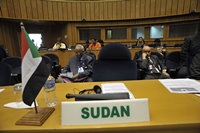Although the referendum in South Sudan appears to be occurring without major incident, the main challenges lie ahead on the way to an independent South Sudan, the universally expected outcome of the voting and subsequent six-month transition period.
The referendum was a key component of the 2005 Comprehensive Peace Agreement (CPA) that ended decades of conflict between the Sudan People's Liberation Movement (SPLM) based in the South, and the Sudanese government in Khartoum, led by Omar Hassan al-Bashir, who seized power in a coup in 1989. Unfortunately, the CPA and subsequent rounds of talks have failed to resolve several important questions that could still derail a successful transition to Southern independence. These include borders and citizenship, economics and energy, public administration and local security, and finally the international relations of the two new countries.
The first set of issues concerns borders and citizenship. One obvious question is where to draw the new North-South interstate border. About 200 miles are still under dispute in five areas, the most important being the Abyei region, where the question of which state the region would belong to proved so explosive that the parties cancelled a parallel referendum also scheduled this month on that issue. Although the Ngok Dinka tribe resides in Abyei year-round, Misseriya nomads from the North move into the region each season to provide water and food for their animals. The ensuing problem of determining who should vote in the referendum proved insurmountable and led to the postponement of the ballot. Fighting between the two groups has unfortunately increased in recent days. To avoid further violence, both sides, with the help of the international community, should probably consider creative ways in which the region or its inhabitants could have dual-nationality status.

